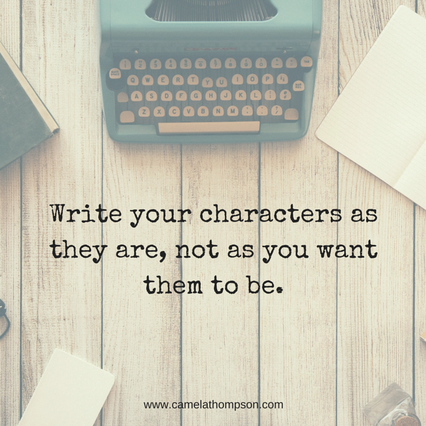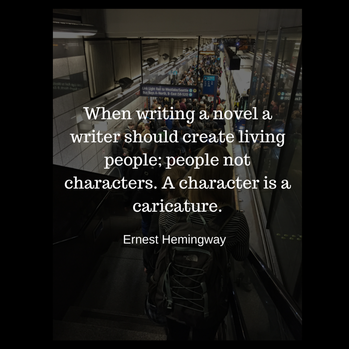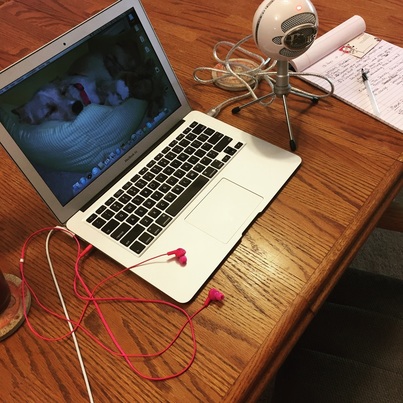|
by Camela Thompson I spent the last week in a cold medicine fueled fugue. I typically prefer to consume only naturally sourced foods, teas, and products. When it became too difficult to suck down enough air to cross a room without being dizzy, I gave up and went to the doctor. I felt honest-to-God joy when she gave me an inhaler and a prescription for an industrial strength cough suppressant, and I'm counting down the minutes until I can dose myself with NyQuil Severe Cold and Flu and set up my humidifier. The one positive to being sick is that I can finally relax and give myself permission to do absolutely nothing. My week was spent binging on Netflix, consuming books, and easing back into work. I found a few gems I thought I would pass along. Anthony Bourdain Parts Unknown Anthony Bourdain's approach to travel is one I appreciate. The areas he covers have experienced deep, often recent, trauma. He'll try any food and not look down his nose at it. He also tends to abide by local customs. There are a few unusual reasons I love this show. Systemic lupus and a list of food allergies makes traveling difficult. Living with a dysfunctional immune system piles additional risk to exposure to bacteria and parasites foreign to what I'm accustomed to, making travel to South America and much of Asia problematic. I'm content to watch Bourdain try foods I'll only dream of from the comfort of my couch. My most loyal companion has insisted on staying by my side all week. Chelsea Handler Does
I squirmed through the first episode on marriage. Handler's disdain and jaded view of marriage were extreme even for me, but I appreciated her approach. Her episode on racism was thought provoking. She didn't deny her position of privilege and questioned her own view points while rigidly maintaining others. I appreciated that she faced several groups who had protested her humor and had an open discussion without it escalating into a room full of yelling people. I feel the material she shared and viewpoints she highlighted were relevant and even necessary. I wish more people would face awkward conversations and challenge their own thinking. The Great British Bake Off It may seem very strange that a Celiac loves watching people make foods she'll never enjoy, but the contrasts between American and British society fascinate me. The baked Alaska incident highlights my meaning. Where Iain ultimately blamed himself for an emotional outburst after finding his ice cream removed from the freezer and thoroughly melted into his glorious sponge cake, I would have drained what I could and kept it as evidence of malicious conduct by a competitor. When winning is at stake, I don't see a problem with throwing someone else under the bus (if they were at fault, of course, and she was). Concealed in Death by JD Robb A few chapters in, I was convinced I knew who the killer was, but I didn't anticipate the twist at the end. I totally knew who the killer was, but it didn't impact my enjoyment of the novel. I have to say I really enjoyed Susan Erickson's narration. Bosch Who needs another crime series? Apparently, this girl does. While it's yet another middle-aged white guy with a traumatic past, the story line was compelling and fast paced. Was it on par with True Detective season one? Of course not. It's still good enough that I would recommend it to crime mystery fans of the CSI and Law & Order vein. I've also been watching and rereading some of my favorites. I'm rereading Janet Evanovich's Stephanie Plum series. There are some things I would do differently (I say the same about my own first book), but the concept is hilarious and her descriptions are fantastic. Supernatural has jumped the shark so many times the poor creature went belly up, but there are still moments I enjoy. I'm currently listening to Anonymous Source by A.C. Fuller on Audible and reading Bel Canto by Ann Patchett. Do you have any current favorites you would like to pass along?
0 Comments
by Camela Thompson "Writer's block is a bitch." I found that little gem while reviewing older versions of a published manuscript. The line sat neatly tucked underneath complaints about my characters. I expressed my concern that Olivia didn't display enough strength. A character who had the canniness to avoid a stalker for ten long years still wasn't ready to turn on him and do him harm. Lucian presented a larger problem. One moment he offered to help a perfect stranger, and the next he displayed a level of selfishness that made him completely unlikable. The concerns punctuated by my obvious predicament of writer's block reminded me of some solid advice I've passed along to others. It's something I have to relearn from time to time. Write your characters as they are, not as you want them to be. My process for writing a novel usually begins with a compelling concept, or even a single line that sticks in my mind. Then the plot comes together. The lengthy part is getting to know my characters. They don't jump out at me during the first few pages. I get impressions of their quirks and some broad strokes of their overall demeanor, but that isn't enough. A story isn't convincing without a strong understanding of the characters. I've broken the factors that drive rewrites and writer's block into three main points. How Do You Motivate a Character to Show Up? Consider a character with severe social anxiety. I need her to go to a party to meet another character who is motivated to help her find a serial kidnapper. A serial kidnapper who (unbeknownst to my main character) is targeting her. What would make her agree to attend a party? It's not likely that her extrovert best friend would be able to simply talk her into attending. If my character is told it's a small get-together and she has a favorite activity that will be the focus of said get-together, she may consider going. If her friend had given up something meaningful in order for her to attend, this may also motivate her. A guilt trip or expressed concern may help push her over the edge. The social anxiety would likely require all of these combined to allow her to make herself uncomfortable. If I can find something that helps reduce her anxiety, I may have a shot at keeping her at the party long enough to interact with someone without having to resort to removing her ride home. How Do Characters Form Bonds? Let's go another layer deeper. What would compel two opposites to bond? My main character's best friend is an extrovert. If they shared something in common, perhaps a secret or a fundamental difference from the people around them, they may have enough in common to bond. Perhaps our extrovert knew what it was like to be different and stuck up for her new friend? Considering my difficulty in getting my main character to a social function, it's unlikely they met at a party. My main character is in college, and it's not impossible to imagine that she hit it off with a new roommate or a classmate. But with an introvert who has the added burden of social anxiety, it may make more sense to have my main character attend a large school if she were able to attend with a best friend. While it's possible my characters met more recently, she would be more likely to tolerate a difficult environment with someone she loves. It would also make my main character more likely to subject herself to discomfort if it were someone she cared for deeply. How Do You Motivate a Character to Act Out of Character? An introvert woman with a kind soul must kill someone. There are several circumstances that could push someone to kill, but the most compelling in this instance is protecting someone my main character loves. Self-defense could also push her to defend herself, but I've seen people who refuse to stand up for themselves put everything on the line for someone who is incapable of defending themselves. Perhaps they wished someone would have done the same for them, but the more likely reason is they know how it feels. And no one should have to feel like a victim. Creating motivating factors that are both internal and external are crucial, but how do you figure out who your character is to being with? I've heard a lot of great advice:
Finally, keep in mind that readers are willing to suspend belief to a point. The reason why it's so important to keep in mind what I've outlined above is because you don't want to lose your readers. If you haven't provided compelling reasons for your characters to act as you need them to, or if you put them in a scenario that doesn't make sense, the reader may walk away from your story. Compelling characters have flaws and quirks, but they also do everything for a reason--whether we agree with them or not.
Who is your favorite character and why do you like them? What kind of motivations made them who they were? by Camela Thompson The weather in Seattle is gorgeous right now. Yesterday I spent most of the day working in the yard. The occasional dog barked, a car whizzed by now and then, but the drone of lawnmowers provided the primary soundtrack. We've had the wettest winter on record, and all of that torrential rain started in January. These past few days have been a very welcome break and our neighbors have responded by attending their yards. A few blocks down, a middle-aged man has been tackling projects to improve a very neglected yard. Because of the temperature, he shed his shirt. A petite woman walked up the hill, stopped on his sidewalk, and proceeded to launch into a litany of loud "compliments." Apparently this gentleman has dreamy blue eyes and a figure she approved of. I stopped walking the dog and watched a very awkward exchange that only lasted a few moments. She walked off grinning from ear to ear, and he stood leaning his gut on his shovel with a flummoxed look on his face. The scenario provided a clear example for the term "catcall" (a shout or call that's negatively perceived by the recipient), but it was the reverse of what I've experienced in my life. He was visibly upset. My response wasn't empathetic. I had to fight the laughter percolating. It proved what I'd told many men: If someone did this to you, you wouldn't like it either. There are some people out there who think yelling "nice ass" or telling people what they want to do with their body is a compliment. I really shouldn't have to explain why this is degrading. But I will because I've seen it so many times. Catcalls are inherently aggressive. Words are spewed without any regard to how the person on the receiving end feels about them. Telling someone what you would do to their body is threatening. It reduces the recipient to an object, and even if that object is being admired, it's dehumanizing. Suddenly I'm reduced to a body part and cringing for the follow-up grab or lean in by someone who's much larger than I am. It's disrespectful and not okay.
My neighbor got a window into life as a woman. When I explain to men what happens to women, especially at night clubs and bars, they're horrified and shocked. They haven't had to decide whether wearing a short skirt is worth looking cute because you know there's a risk someone will try to flip it up. Many of them haven't been groped in passing only to turn and see a wall of men looking in different directions. They probably haven't been relentlessly pursued around the bar after trying to nicely tell the guy you're not interested. They always get confused by the polite part and insist it only encourages people. Being rude escalates the situation in my experience. A flat out rejection leads to accusations and even being burned with a cigarette (that was a bad night). Many of us understand that accepted "bro" behavior is destructive. My neighbor should now. Maybe if this scenario was more common, we'd see less of it. I'd rather treat my fellow humans with some respect and hope for the same in return. by Camela Thompson There are millions of book titles published each year, and much of this is due to the ease of self-publishing. The sheer volume makes it harder than ever to be noticed as an author. I thought podcasting might be a way to get my personality out there in a way that engaged potential readers. As I consider disbanding the podcast Shadows on the Sound, I've thought a lot about what I've learned, both positive and negative. It's Easy Anyone with a laptop can have a podcast. Setting up with iTunes is very simple. Don't stop researching there. Read their best practices section, join podcast groups on Facebook, and don't be afraid to ask a lot of questions. It's critical that you choose a name that is eye catching and gives insight into your topic choices (oops). Tags and descriptors will determine whether or not people find your show. Take the time to listen to the shows that already exist in your genre to make sure you're not trying to fill a niche that's already at capacity. Consider Your Content As an author, it's very temping to develop a podcast centered around writing. Don't do it unless you have something unique to offer. Very unique. Because there are a billion writing podcasts out there already that are phenomenal. We decided to focus on mythology's influence on popular culture. I enjoyed the topics and we had some wonderful guests. Towards the end, I know I struggled balancing health, work, book stuff, and the podcast. It showed. I didn't feel prepared and spoke less. Knowing your subject matter is important, but so is preparing for each individual show. Research Audio Hosting Sites I went with the first site I stumbled on despite urging from a fellow podcaster to go with a different site. See my earlier comment about joining Facebook podcast groups and asking a lot of questions. Some sites offer advertising in addition to hosting. Any ounce of advertising helps. My setup. Invest When It's Smart
There are a lot of low cost ways to record a podcast. We used Google Hangouts on Air to record our podcasts. It's simple to set up the recording to feed automatically to a YouTube channel. I locked the recording to private and then used programs that came with my laptop to strip the audio from the video, then fed that file to Audacity--a free audio editing software you can download. It made editing simple. You will have to spend money, but spend it on the following things: a decent microphone, internet speed, and hosting sites. I used a Blue Snowball microphone and liked it. I've also heard good things about the Yeti. Unfortunately, I didn't figure out some quirks until the last few episodes. I had to throw away one episode because I didn't realize the headphones I used also had a microphone built in that banged against the zipper on my jacket. I spent several other episodes clueless that Google Hangouts wasn't registering my very nice microphone and defaulting to my laptop. I also learned to coach other participants to use headphones because audio loop is highly distracting and not something you can edit out. Edit We tried reading from a script and it sounded very unnatural. We tried free flow and the conversation went off the rails. A good middle ground for us: a set agenda with bullet points so that one of us could steer us back on track if we went down a rabbit hole. In all cases I had to do some considerable editing. The occasional "um" or pause is natural, but there were times I had to take out a lot of content to save an episode for a general audience. If you're trying to build a brand and someone goes on a political tirade, it's wise to consider what you publish. Invite Guests Ask your friends, acquaintances (if they know about the topic), and people you consider famous. You'll be surprised at who says yes. Besides, the worst they can say is no. Another opinion offers diversity and can make the topic more interesting. Market, Market, Market This is where I feel we fell flat. Working full time, pushing myself to get multiple books out per year, marketing my books, managing social media, and spending multiple hours per week recording and editing podcasts leaves zero time to market. There just aren't enough hours in the day to do it justice without throwing money at the problem. A friend has done a wonderful job on our Facebook page, but without advertising, tweets, and posts to drive listeners to our page, we peaked at 21 followers. My author page has nearly 700. I know I could have done better, but I ran out of steam. I didn't have the energy to spend on advertising, and grew frustrated over time. Shows like Serial (which I LOVE--If you haven't heard it, check it out) have raised the bar for podcast professionalism. It is more difficult to be noticed and gain traction with a home grown show, but it's possible. Network and research prior to posting your first episode. Advertising is a must. We learned as we went, but if I had to do it all again, this is not the approach I would take. I'm considering coordinating with some writer friends and starting a Youtube station based on Google Hangouts that have live participation. This time I am going to research and try to be realistic about the time I have to dedicate to a new project. What's tough is a topic choice. I'd love to have a show that focuses on writing challenges, such as representing more diversity and writing with a social conscience, but I'm not convinced these topics would resonate with readers. I'm at a bit of a loss. For now. Do you listen to many podcasts? Which are your favorites? Is there a topic you'd like to listen to but haven't found yet? |
Camela ThompsonFreelance writer and Dark urban fantasy author featuring vampires with bite. My BooksCategories
All
Archives
July 2020
|





 RSS Feed
RSS Feed